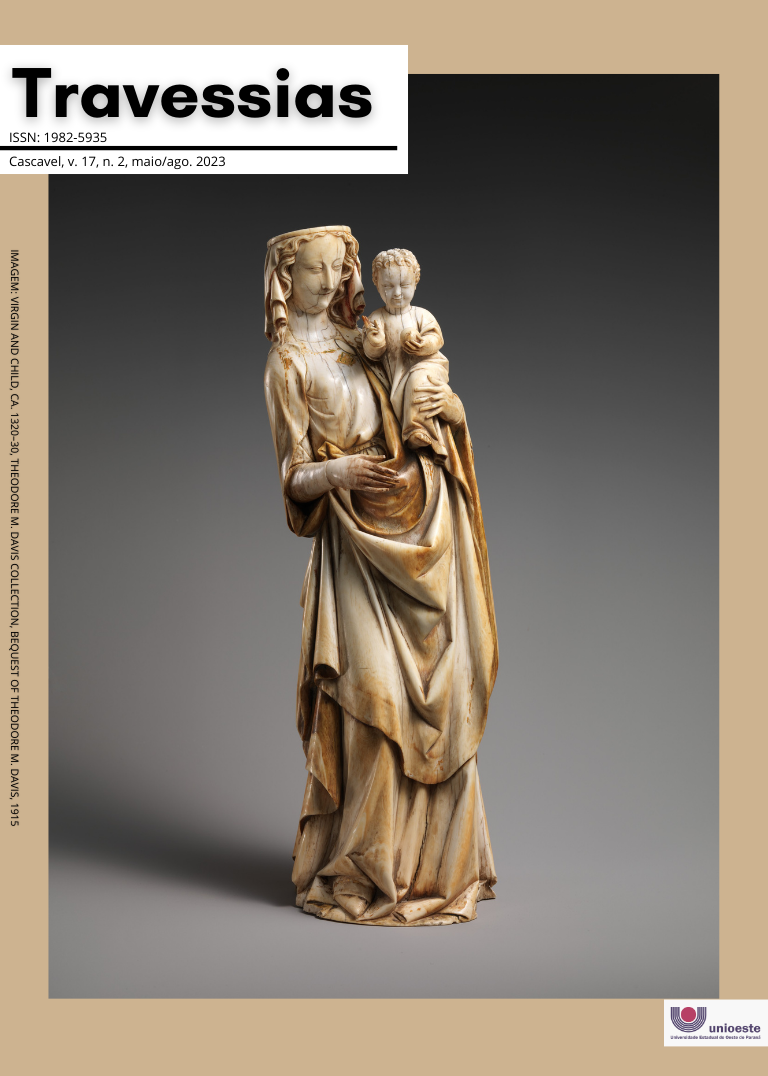As mulheres são todas iguais?
Representações e interseccionalidades nos contos Maria, de Conceição Evaristo, e Amor, de Clarice Lispector
DOI:
https://doi.org/10.48075/rt.v17i2.31460Palavras-chave:
Estudos Culturais, Interseccionalidade, Literatura BrasileiraResumo
Este artigo tem o objetivo de analisar as representações de gênero, raça e classe contidas nos contos Maria, de Conceição Evaristo (1991), e Amor, de Clarice Lispector (1960), de forma interseccional. As duas narrativas foram escritas na contemporaneidade, mas trazem representações distintas, uma vez que as personagens Maria e Ana, respectivamente, estão posicionadas enquanto sujeitas em locais diferentes e, portanto, perpassadas por fatores diversos. No âmbito metodológico, realiza-se uma análise cultural, enquanto no âmbito teórico faz-se uso de autoras como bell hooks (2019); Grada Kilomba (2019); Lélia González (1982); entre outras. De modo preliminar, é possível perceber que, embora as duas personagens sejam mulheres, elas não são representadas do mesmo modo, já que enquanto Ana é uma dona de casa de classe média que pode cuidar de seus filhos em período integral, Maria é uma empregada doméstica que trabalha excessivamente para sustentar os seus, o que faz com que preocupações diferentes atravessem cada uma.
Downloads
Referências
ALVES, Eliada Mayara Cardoso da Silva; VOSS, Dulce Mari da Silva. Mulheres em mirada decolonial: um quase tudo. In: VOSS, Dulce Mari da Silva. Mulheres escrevendo e pensando com mulheres: filosofias, infâncias e educação. Rio de Janeiro: NEFI, 2022.
ANECLETO, Úrsula Cunha; VIEIRA, Rosane. Prefácio. In: SILVA, Ana Lúcia Gomes da; SILVA, Jerônimo Jorge Cavalcante Silva; RODRIGUEZ, Victor Manuel Amar. Interseccionalidades em Pauta: gênero, raça, sexualidades e classe social. Salvador: EDUFBA, 2020.
BATISTA, Angélica Maria Santana. Mundos possíveis, porém ignorados: a composição de personagens femininas em narrativas de Conceição Evaristo. 2019. 162 f. Tese (Doutorado em Letras) – Universidade Estadual do Rio de Janeiro, Rio de Janeiro, 2019. Disponível em: https://www.bdtd.uerj.br:8443/handle/1/5979. Acesso em: 20 maio 2023.
DAVIS, Ângela. Mulheres, raça e classe. São Paulo: Boitempo, 2016.
EVARISTO, Conceição. Literatura negra: uma poética de nossa afro-brasilidade. SCRIPTA, Belo Horizonte, v. 13, n. 25, p. 17-31, 2009. Disponível em: http://periodicos.pucminas.br/index.php/scripta/article/view/4365. Acesso em: 12 maio 2023.
EVARISTO, Conceição. Olhos D’Água. Rio de Janeiro: Pallas, 2016.
EVARISTO, Conceição. Questão de pele para além da pele. In: RUFFATO, Luiz (org.). Questões de pele: contos sobre preconceito racial. Rio de Janeiro: 2009.
GONZÁLEZ, Lélia. A mulher negra na sociedade brasileira. Rio de Janeiro: Graal, 1982.
GONZÁLEZ, Lélia. Lugar de negro. Rio de Janeiro: Marco zero, 1982.
HALL, Stuart. Cultura e Representação. Rio de Janeiro: PUC-Rio, 2016.
HOOKS, bell. E eu não sou uma mulher? Rio de Janeiro: Rosa dos Tempos, 2019.
HOOKS, bell. Teoria feminista: da margem ao centro. São Paulo: Perspectiva, 2019.
KILOMBA. Grada. Memórias da plantação: episódios de racismo cotidiano. Rio de Janeiro: Cobogó, 2019.
LISPECTOR, Clarice. Todos os Contos. Rio de Janeiro: Rocco, 2016.
MIRANDA, Fernanda Rodrigues de; ASSUNÇÃO, Marcello Felisberto Morais de. Indisciplinando o cânone: pensamento afrodiaspórico e a colonialidade no campo historiográfico e literário. In: MIRANDA, Fernanda Rodrigues de; ASSUNÇÃO, Marcello Felisberto Morais de (org.). Pensamento afrodiaspórico em perspectiva: abordagens no campo da História e da Literatura. Porto Alegre: Fi, 2021.
MIZAEL, Táhcita Medrado; BARROZO, Sarah Carolinne Vasconcelos; HUNZIKER, Maria Helena Leite. Solidão da mulher negra: uma revisão da literatura. Revista da ABPN, Curitiba, v. 13, n. 38, p. 212-239, 2021. Disponível em: https://abpnrevista.org.br/site/article/view/1270. Acesso em: 20 maio 2023.
NASCIMENTO, Beatriz. A mulher negra no mercado de trabalho. Rio de Janeiro: Jornal Última Hora, 1976. Disponível em: https://www.geledes.org.br/a-mulher-negra-no-mercado-de-trabalho-por-beatriz-nascimento/. Acesso em: 23 maio 2023.
PERRONE-MOISÉS, Leyla. Mutações da literatura no século XXI. São Paulo: Companhia das Letras, 2016.
RUFFATO, Luiz. À Flor da Pele. In: RUFFATO, Luiz (org.). Questões de pele: contos sobre preconceito racial. Rio de Janeiro: 2009.
Downloads
Publicado
Como Citar
Edição
Seção
Licença
Copyright (c) 2023 Autores mantêm os direitos autorais e concedem à revista o direito de primeira publicação, com o trabalho simultaneamente licenciado sob CC-BY-NC-SA 4.0 que permite o compartilhamento do trabalho com indicação da autoria e publicação inicial nesta revista

Este trabalho está licenciado sob uma licença Creative Commons Attribution-NonCommercial-ShareAlike 4.0 International License.
Aviso de Direito Autoral Creative Commons
Política para Periódicos de Acesso Livre
Autores que publicam nesta revista concordam com os seguintes termos:
1. Autores mantêm os direitos autorais e concedem à revista o direito de primeira publicação, com o trabalho simultaneamente licenciado sob a Licença Creative Commons Attribution que permite o compartilhamento do trabalho com reconhecimento da autoria e publicação inicial nesta revista.
2. Autores têm autorização para assumir contratos adicionais separadamente, para distribuição não-exclusiva da versão do trabalho publicada nesta revista (ex.: publicar em repositório institucional ou como capítulo de livro), com reconhecimento de autoria e publicação inicial nesta revista.
3. Autores têm permissão e são estimulados a publicar e distribuir seu trabalho online (ex.: em repositórios institucionais ou na sua página pessoal) a qualquer ponto antes ou durante o processo editorial, já que isso pode gerar alterações produtivas, bem como aumentar o impacto e a citação do trabalho publicado (Veja O Efeito do Acesso Livre).
Licença Creative Commons
Esta obra está licenciada com uma Licença Creative Commons Atribuição-NãoComercial-CompartilhaIgual 4.0 Internacional, o que permite compartilhar, copiar, distribuir, exibir, reproduzir, a totalidade ou partes desde que não tenha objetivo comercial e sejam citados os autores e a fonte.



